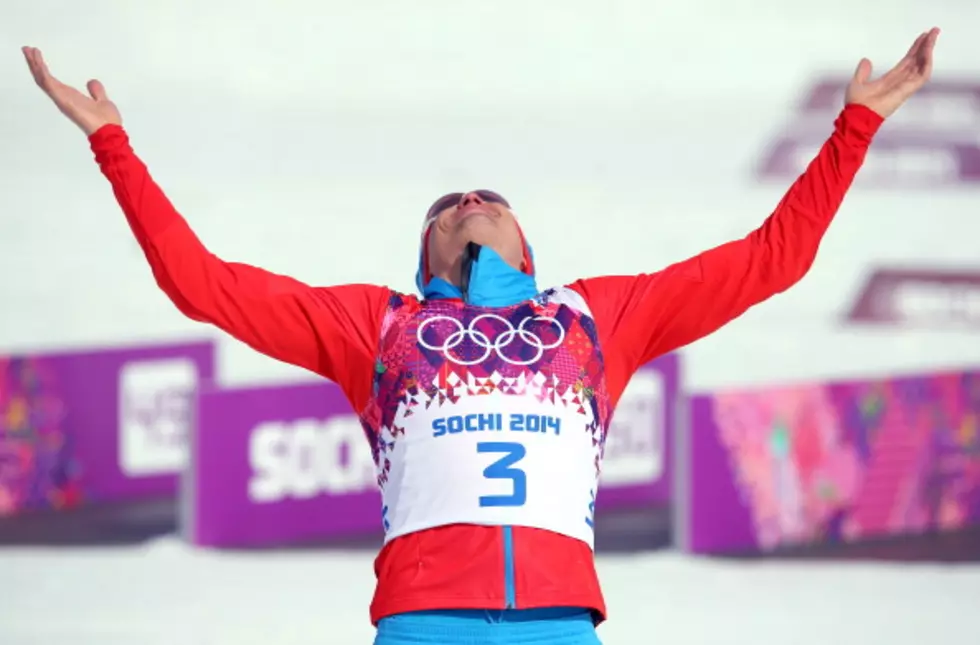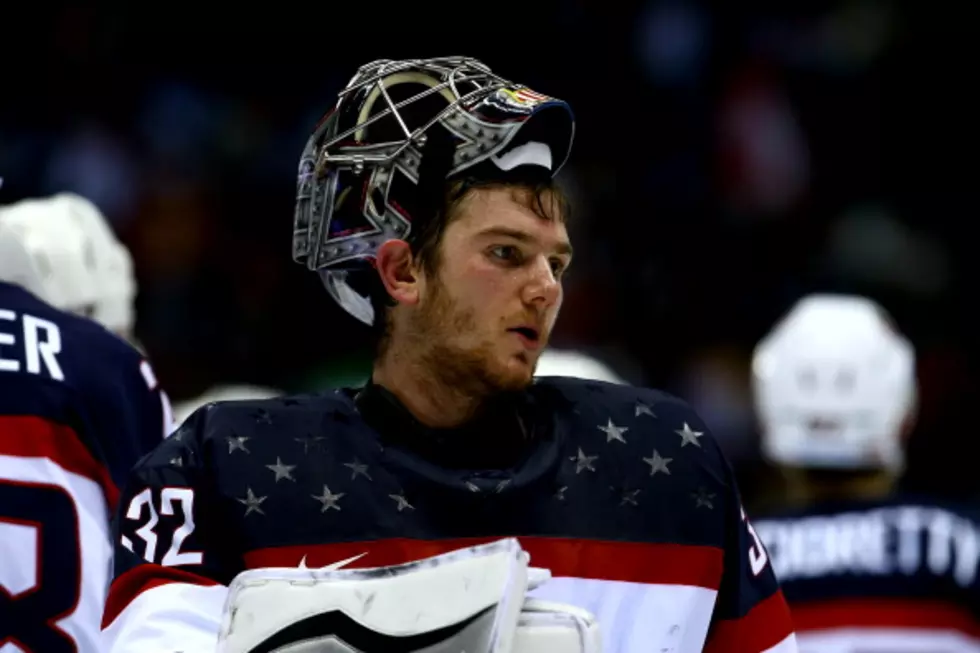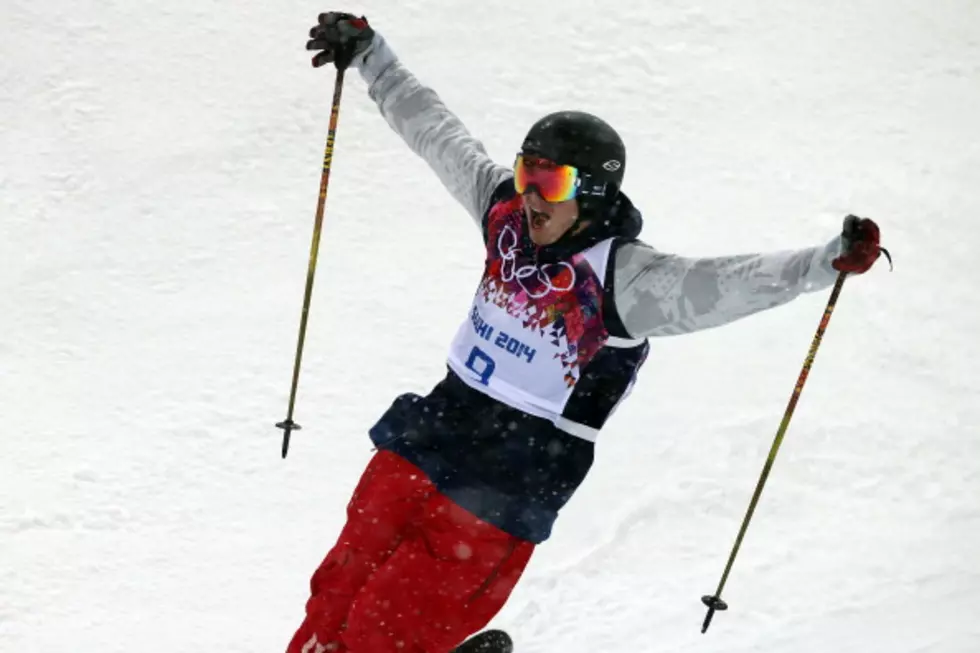
Scenes from Sochi: The 2014 Winter Olympics
The Olympic flame in Sochi has become a selfie hotspot.
Taking a self-portrait with a cellphone camera has become wildly popular, and the opportunity do it with one of the most iconic Olympic symbols in the background is proving to be one of the biggest attractions at the Sochi Games.
In fact, so many people are doing it upon entering Olympic Park that a bit of a competition has broken out, with fans going for unique poses to set themselves apart from the flood of flame selfies on Twitter, Facebook and Instagram.
A state-run children's ballet ensemble from the nearby city of Rostov-on-Don broke into a choreographed dance when Swan Lake came over the loudspeakers, while their instructor took pictures with the flame just behind them.
"We're seeing it for the first time," Yulya Podgurskaya says. "It's very beautiful."
For some Russians, it's become a can't-miss chance to express some patriotism and revel in having the biggest sporting event in the world in their backyard.
Philip Shustov went one step further, putting his 10-year-old son back in Moscow on FaceTime on his iPhone to let him see the flame.
Shustov says the flame is the defining symbol "of the games, of New Russia. I don't remember previous Olympic Games because I was only 3 years old. Now it's history here in Russia."
Russia is hosting the Olympics for the first time since the 1980 Summer Games in Moscow.
* * * * * * * * * * * *
Skiing sisters Justine and Chloe Dufour-Lapointe won over many new fans as the first Canadian siblings to medal in the same Olympic event.
But in a packed news conference Sunday, Chloe wept as she reflected on two of their most important: their parents.
"I'm sorry I'm overwhelmed," said the 22-year-old women's moguls silver-medalist. "This is the best moment in my life."
She said she and her two sisters — 19-year-old gold-medalist Justine and 25-year-old Maxine, who competed in the same event but didn't place — knew they couldn't let their parents down after they'd made sure their daughters had everything they needed to participate in sports.
"You would think that it's not a big deal because it's a run down the hill," Chloe Dufour-Lapointe said. "But there are years of training behind it and I just told myself, 'You have to be very brave, you have to do what you can.'"
The moment loosened up a tightly orchestrated news conference, with French and English-speaking journalists squabbling about which language answers should be spoken in and where everyone should stand when the athletes entered the room with their parents.
The middle sister made the affair a family celebration, where the girls and their parents talked about sharing pea soup, summers on a sailboat and sibling rivalry.
And the future, too — Maxine said she plans to definitely compete again to try to match her sisters, and Justine speculated about launching a clothing line.
Sitting next to them, their father Yves Lapointe was asked about the sacrifices he'd made to get them to that point.
The engineer said he wouldn't put things that way.
"It's all about choices — what you want to do," he said. "Sacrifices, I don't think is the right word. Choice is much better."
* * * * * * * * * * * *
Dozens of reporters, cameramen and Olympic volunteers mobbed the practice rink behind Shayba Arena, leaning over railings and pressing against the glass while part of the Russian men's hockey team went through a workout.
Just imagine what it'll be like when Alex Ovechkin gets to Sochi.
The Russians know they're under extraordinary pressure to win their nation's first gold medal in hockey since 1992, but the remarkable media turnout for a mere practice Sunday certainly underlined it.
"It looks like it's a really big deal worldwide," said Viktor Tikhonov, the former Phoenix Coyotes forward. "It just kind of shows you (the) scope ... it's always nice to see how interested people are."
The Russians are giving themselves every chance to play well. The domestic Kontinental Hockey League began its Olympic break more than two weeks before the first puck drops in Sochi, and its players on the national team held private workouts in Kazan for the past week. They even skipped the opening ceremony.
Russia actually went through two practices Sunday, quite unusual in the compacted Olympic schedule. They'll be back on the ice Monday night, after their NHL stars begin to arrive.
* * * * * * * * * * * *
Speedskating seems simple: Pace yourself properly, don't get in your opponent's way and go, go, go.
But the men's 5,000-meter final at the Sochi Games shows a subtle challenge for athletes in a simple-looking sport: Strategy.
"Skating is hard — there's lots of things you have to figure out," Norway's Havard Bokko said. "It's really technical."
For Russia's Denis Yuskov, an approach of starting "as fast as possible" in hopes of maintaining it through the end didn't pay off.
"I feel like it's my usual strategy," Yuskov said through an interpreter, though he said the psychological effect of being at the Olympics was a new feeling.
He had the best time at 6:19.51 after 18 of 26 skaters took the ice, but was visibly exhausted as he finished the race — having slowed down tremendously down the final stretch.
He knew the time wouldn't hold up. Yuskov ultimately finished sixth; Sven Kramer of the Netherlands broke his own Olympic record, finishing with a time of 6:10.76 — and average of 29.8 mph.
"The beginning was good but the end was very bad," he said.
Bokko said speedskaters have to skate and breathe with proper technique, have strong legs and a strong heart.
"Keep it together the whole race if you want to skate good and fast," he said.
Kramer was actually running behind Yuskov's time for most of the race, until the final four laps. That's when he made his move, extending his edge with each lap until he'd beaten Yuskov's time by nearly 9 seconds.
* * * * * * * * * * * *
U.S. skater Jason Brown says it is "surreal" to be a YouTube star. Video of his skate at the U.S. championships in January that earned him a spot at the Sochi Olympics has 3,603,509 hits ... and counting.
Turned on to his YouTube stardom by Dylan, his 15-year-old brother who is "obsessed" by the numbers, Brown said he, too, has now fallen into the habit of keeping track of his hits.
At first, "I literally didn't believe him. I was just like, 'Ha, ha, ha. OK,'" said Brown, of Highland Park, Ill. "And then, five hours later, my friend texted me and they're like, 'You're trending on Twitter. You're on BuzzFeed. Now you have 500,000 views.' And I was like, 'Noooo! No, no.' And then I went on that night and it was 800,000 views and the next morning I woke up and it's 1 million."
"It was definitely exciting to see it grow and, you know, it definitely is something that is so surreal and means so much to me that people got invested in watching."
* * * * * * * * * * * *
Even before the race, cross-country skier Jessica Diggins knew she was going to shine in the opening event of her first Olympics.
Like her American teammates in the women's 15-kilometer skiathlon Saturday, Diggins put on a massive layer of glitter makeup.
But it wasn't just her face that sparkled. Her skiing did, too. The Afton, Minn. native finished eighth, trailing gold medalist Marit Bjoergen of Norway by 1 minute, 31.9 seconds.
"That was awesome, that felt incredible," Diggins said. "I am so happy I am just on cloud nine right now."
Diggins said she targeted a finish "in the top 20, not the top 10."
"This was one of the best races in my life," she said. "It just felt so good to have a good race, and especially on a hard course at the Olympics, my parents watching, to hear them out cheering for me just gave me the boost I needed."
Diggins, who won the world team sprint title alongside Kikkan Randall last year, said she will stick to the same glitter makeup routine for her upcoming events in Sochi.
"This is fun. I do it because I love it," she says. "When I am happy and when I am having fun, then that's when I race well."
The only thing that didn't work out perfectly for Diggins on Saturday was her attempt to paint her ponytail red, white and blue: "Well, it's more like pink, white and blue."
* * * * * * * * * * * *
Kate Hansen is not lacking for Olympic personality.
She's one of the younger sliders on the World Cup luge circuit, yet can talk just about anyone into anything. One of her claims to fame is making videos of athletes, including a holiday-themed one this season where she and fellow U.S. luger Erin Hamlin got athletes, coaches and even media from plenty of nations to take part and lip sync Mariah Carey's "All I Want For Christmas."
So that's earned her a certain amount of acclaim among sliders.
Back at home in Southern California, they're taking notice as well. Turns out Hansen — from La Canada, Calif., a student at Brigham Young and America's first winner of a World Cup singles race this season since 1997 — is on a billboard wishing her luck at the Sochi Games.
"Apparently, the Olympics are a pretty big deal because someone put up a billboard of me," Hansen says. "And I've never been on a billboard. That doesn't happen."
Clearly, it does. And to use one of her go-to words, she's pretty stoked about it.
* * * * * * * * * * * *
The new team event has added a heaping dose of national pride to figure skating.
In this sport, though, athletes and coaches are always crossing borders. Japan's entries in the ice dance Saturday are New Jersey's own Cathy and Chris Reed. The siblings have dual citizenship in the United States and Japan but represent the nation where their mother was born because it gave them the best chance to compete at the highest level.
Plenty of coaches are guiding skaters who are trying to beat their home countries. Some examples: Marina Zoueva, from host Russia, works with the top two ice dance teams, Meryl Davis and Charlie White of the U.S. and Tessa Virtue and Scott Moir of Canada. Canada's Brian Orser mentors Japan's Yuzuru Hanyu. Japan's Yuka Sato coaches American Jeremy Abbott.
* * * * * * * * * * * *
Tucker West's long slide to the Olympics began on a luge track his dad built in their backyard.
Inspired by watching the sliding sport during the 2002 Salt Lake Games with Tucker, then only 6, Brett West decided to construct a luge run behind the family's home in Ridgefield, Conn. Without even drawing up plans, the Wests went to work and wound up with a functional, 800-foot-long wooden track.
The Wests even nicknamed a few of the turns, including McClaine's Curve, because it bent toward the home of their neighbors, the McClaines.
The 18-year-old West, the youngest-ever member of the U.S. luge team, credits the track with getting him started.
"It's awesome," said West, who will compete in his first games on Saturday. "It's still working."
West had the fifth best start time during Friday's final practice run, even faster than two-time gold medalist Armin Zoeggeler of Italy. The U.S. has never won an Olympic medal in singles, but Erin Hamlin, a former world champion, World Cup race winner Kate Hansen, and two-time Olympian Chris Mazdzer could surprise and make the podium.
In West and 19-year-old teammate Aidan Kelly of West Islip, N.Y., the Americans have a young nucleus that should improve through experience.
And who knows? There may a few 6-year-olds who watch them and convince their dads to grab a hammer and nails and head out back.
* * * * * * * * * * * *
American slopestyle snowboarder Chas Guldemond thinks it might be time for Olympic judges to go back to school.
Guldemond missed the finals after finishing seventh in the semifinals on Saturday, posting a score of 79.75. Guldemond landed a triple cork — three flips — but missed out on the top four by full five points.
While not complaining about his score specifically, Guldemond said it was tough to get a handle on what the judges wanted.
"They're all over the place, so it's kind of hard to track them down," said Guldemond, of Truckee, Calif.
The Olympics use judges from the International Ski Federation (FIS), who typically judge World Cup events. The sport's top riders, however, largely compete in World Snowboard Tour events like the X Games.
Guldemond, who is on the World Snowboard Tour board of directors, says the tour brings judges in three times a year to update them the state of the sport. The FIS does not.
"''I think we need to educate," he said. "In any business industry you need to educate and keep people on the cutting edge of snowboarding and that's what needs to continue to happen. And yeah, we're working on it."
* * * * * * * * * * * *
How do you prepare a 15-year-old for the goosebumps that come when an entire country howls her name?
The Russian figure skating coaches tried to tell Julia Lipnitskaia what it would be like when she took the ice for the first time in the Sochi Games. But all the words, all the practice, all the advice in the world couldn't replicate the vibration in the Iceberg Skating Palace when thousands of Russians stomped their feet on the floor and chanted "Julia! Julia!" in unison.
"I was very confident," the bright-eyed teen said with a smile. "My trainers told me people would cry. They told me people would clap to the music. But I didn't think the spectators would be so loud. But it helped me to perform."
If she was rattled, it sure didn't show during a sparkling performance in the short program. She scored a 72.90 to put the Russians in first place in the team competition.
"It was a real pleasure for me," she said. "I'm glad I made it pleasurable for the spectators and put my team in first place."
* * * * * * * * * * * *
Talk about a generation gap.
The 60-year-old head of the IOC caught up Saturday night with the Olympic snowboard medalists — including one with his long hair standing straight up in gravity-defying fashion.
"Cool guys," IOC President Thomas Bach said after meeting the trio at the slopestyle medal presentation, where they celebrated in effusive fashion.
"They are waiting now for the party to begin after they have the medal. Of course, when you win a medal, you always enjoy," he said. "That's the modern generation, that's fine."
Sage Kotsenburg , a 20-year-old American, won the first gold of the games in slopestyle's Olympic debut. Staale Sandbech of Norway — with the wild hairdo — took the silver and Mark McMorris of Canada got bronze.
Slopestyle features huge jumps, flips and tricks. It's the type of sport the IOC hopes can attract younger fans and viewers.
"It looks very spectacular," said Bach, who had hoped to watch the event live but didn't get there in time after going to the women's 15-kilometer cross-country skiathlon.
On the other end of the generation spectrum, Bach was bowled over by 40-year-old Ole Einar Bjoerndalen's victory in the men's 10K cross-country race.
When an Associated Press reporter informed Bach of the result, he did a doubletake.
"Yeah? Yeah?" he said. " Ooh la la. Chapeau (well done)."
Bjoerndalen became the oldest Winter Olympic individual gold medalist and tied fellow Norwegian Bjorne Daelhie's record for most overall medals in the Winter Games with 12.
Bjoerndalen was a surprise winner Saturday. He hadn't won an individual competition on the World Cup circuit for almost two years.
"This comeback, everybody thought it would be over for him," Bach said. To do that, "that's really quite something."
More From New Jersey 101.5 FM









